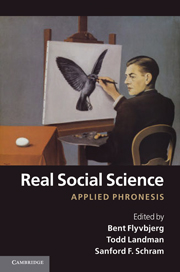Book contents
- Frontmatter
- Contents
- Figures
- Tables
- Contributors
- Acknowledgements
- 1 Introduction: new directions in social science
- Part I Theory and method
- 2 Phronetic social science: an idea whose time has come
- 3 Phronesis and narrative analysis
- 4 The feel for power games: everyday phronesis and social theory
- 5 Phronesis, projects and power research
- Part II Applied phronesis
- 6 Why mass media matter and how to work with them: phronesis and megaprojects
- 7 Power and conflict in collaborative research
- 8 Unsettling a settler society: film, phronesis and collaborative planning in small-town Canada
- 9 Phronesis and critical policy analysis: Heathrow's ‘third runway’ and the politics of sustainable aviation in the United Kingdom
- 10 Amnesty in the age of accountability: Brazil in comparative context
- 11 Feminist phronesis and technologies of citizenship
- 12 Making the teaching of social justice matter
- 13 Spatial phronesis: a case study in geosurveillance
- 14 Important next steps in phronetic social science
- Index
- References
5 - Phronesis, projects and power research
Published online by Cambridge University Press: 05 June 2012
- Frontmatter
- Contents
- Figures
- Tables
- Contributors
- Acknowledgements
- 1 Introduction: new directions in social science
- Part I Theory and method
- 2 Phronetic social science: an idea whose time has come
- 3 Phronesis and narrative analysis
- 4 The feel for power games: everyday phronesis and social theory
- 5 Phronesis, projects and power research
- Part II Applied phronesis
- 6 Why mass media matter and how to work with them: phronesis and megaprojects
- 7 Power and conflict in collaborative research
- 8 Unsettling a settler society: film, phronesis and collaborative planning in small-town Canada
- 9 Phronesis and critical policy analysis: Heathrow's ‘third runway’ and the politics of sustainable aviation in the United Kingdom
- 10 Amnesty in the age of accountability: Brazil in comparative context
- 11 Feminist phronesis and technologies of citizenship
- 12 Making the teaching of social justice matter
- 13 Spatial phronesis: a case study in geosurveillance
- 14 Important next steps in phronetic social science
- Index
- References
Summary
Introduction
This chapter will not be an account of hard research in the time honoured way: big theory; general hypotheses; specific propositions; general models; survey data collection; and sophisticated quantitative analysis. Lest this sound like a caricature, let us note that hard political science has been characterized by Kasza (2006) as a combination of quantitative analysis and formal modelling and an omission of political philosophy. Ranged against this, he argues, is something known in political science circles in the United States as the Perestroika movement, which offers a radical critique of hard science, for which Flyvbjerg's (2001) book has become a beacon. We shall consider some of the issues that Kasza raises in relation to the central topic of Flyvbjerg's (1998) work on power. In recent years, much of this work has been conducted in collaboration between the authors, looking at power and human relations in the context of megaproject alliances (Clegg et al. 2002; Pitsis et al. 2003; Pitsis, Kornberger and Clegg 2004; van Marrewijk et al. 2008; Bjorkeng, Pitsis and Clegg 2009). Ontologically, we have to admit that few of these papers, if any, were the working out of an a priori research design or theory and that there was precious little rational choice involved, features that characterize, as Kasza suggests, a ‘hard science’ model.
Research is as much a process of power as any other sphere of social life. In our experience social science research certainly is not a sphere characterized by the elegant theory-driven abstract rationalities of the hard science model. We do not believe this is because our experience indicates that we are particularly inept researchers. Nor do we believe that we became entangled in power relations almost from the outset of the project because we were operating in a field that is somehow pre-paradigmatic (as Dreyfus 1991 suggests) or post-paradigmatic (as Schram 2003 suggests). We agree with Flyvbjerg (2006: 64) that, in fact, social science is non-paradigmatic: there have clearly been periods when in specific fields it appears as if there is a dominant paradigm but, we would argue, the mechanisms of its maintenance are, above all, political: they have to do with sponsorship, enrolment, journal editorships and board composition, and nationality. Most prestigious journals are invariably dominated by North Americans who share much habitus in common, such as graduate school, training and cognitive maps of the field of production of knowledge.
Information
- Type
- Chapter
- Information
- Real Social ScienceApplied Phronesis, pp. 66 - 92Publisher: Cambridge University PressPrint publication year: 2012
References
Accessibility standard: Unknown
Why this information is here
This section outlines the accessibility features of this content - including support for screen readers, full keyboard navigation and high-contrast display options. This may not be relevant for you.Accessibility Information
- 11
- Cited by
